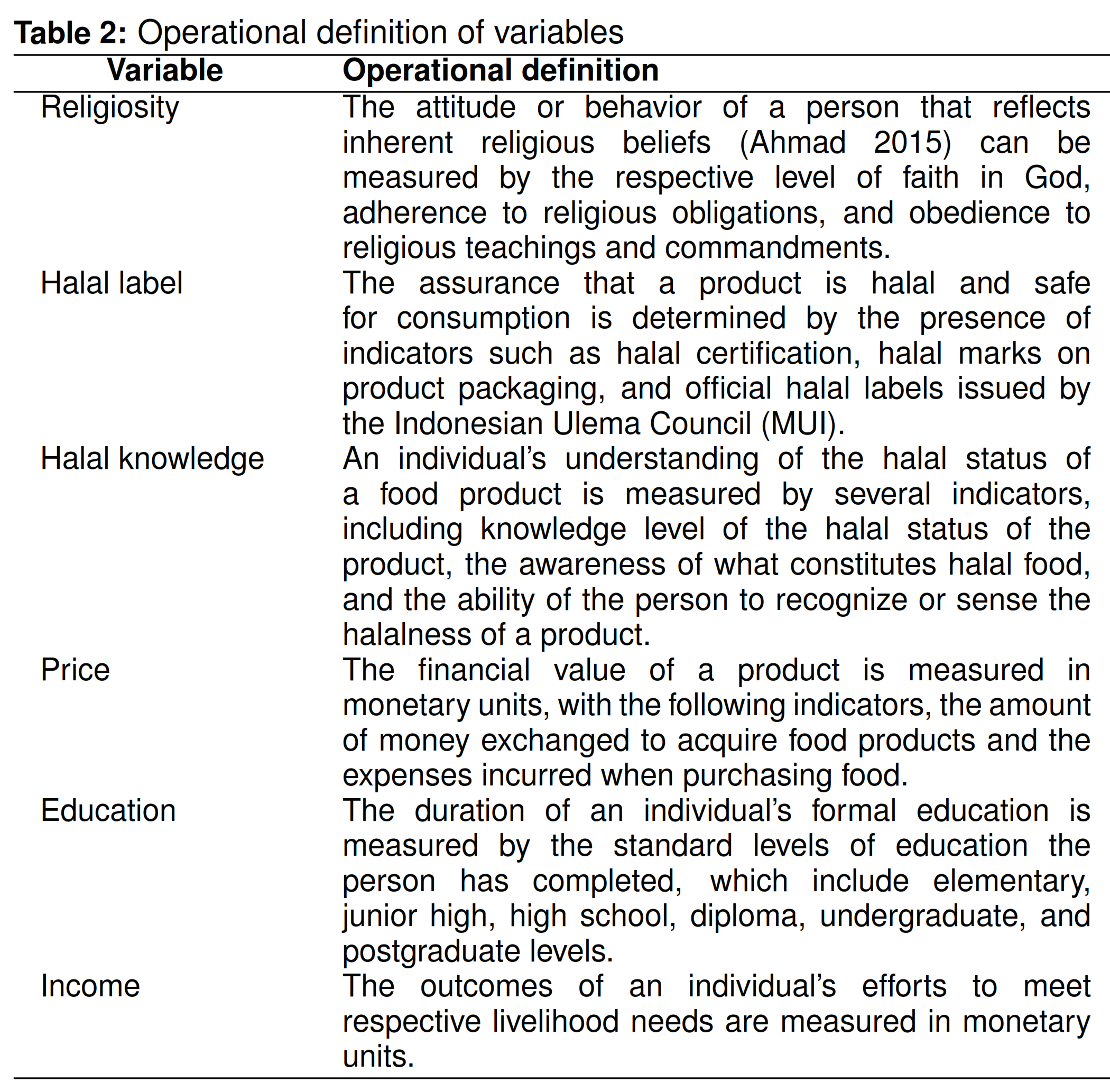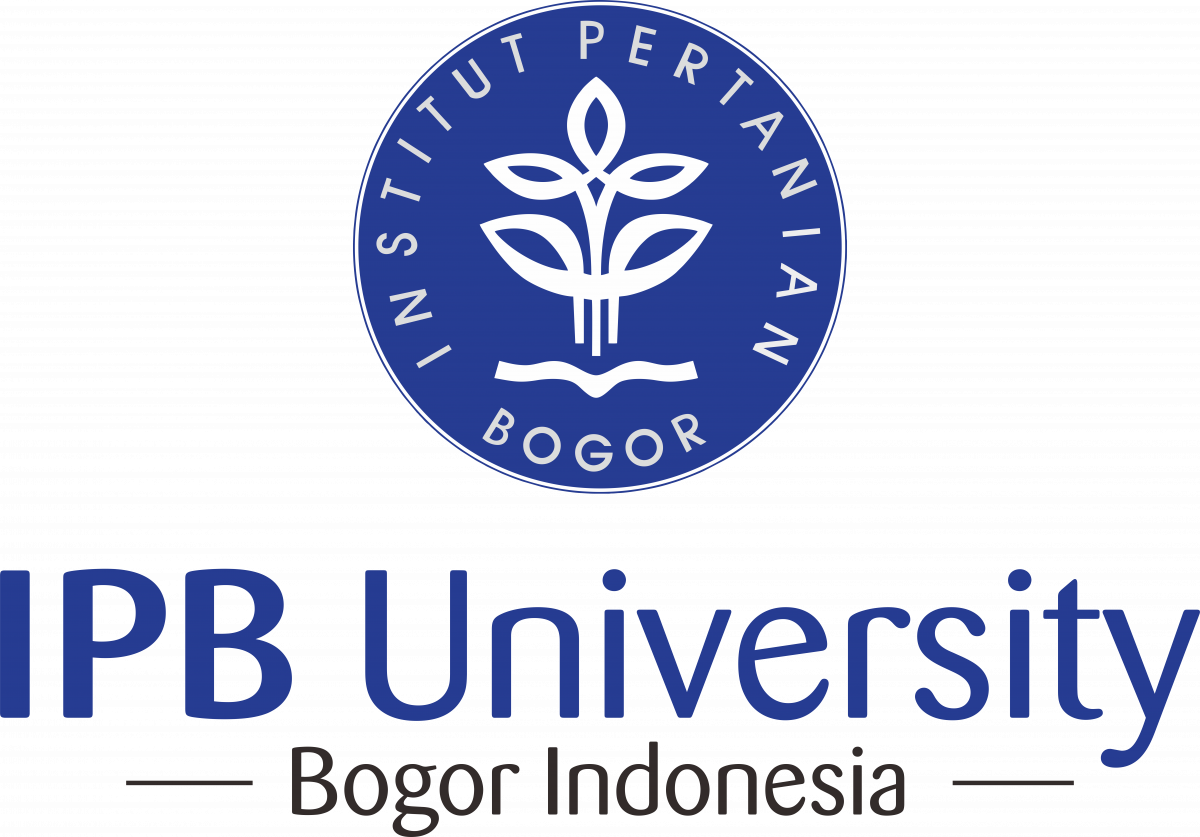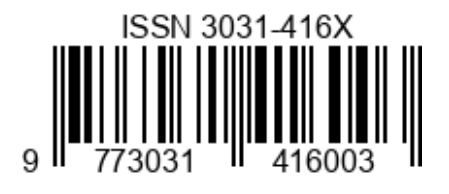Lower middle-class community awareness of halal food and the factors that influence it
Abstract
The middle class forms a substantial segment of the population of Indonesia. However, it is important to recognize that individuals in the lower middle-class, due to their limited income, may have caring levels of concern about the halal status of the food they consume. Therefore, this study aimed to evaluate the awareness of the lower middle-class community regarding halal food and to identify the factors influencing this awareness. In order to achieve the stated objective, the investigation was based on primary data collected from 100 respondents in Tebet, one of the poorest districts in South Jakarta. Using descriptive statistics and logistic regression for analysis, the obtained results showed that the lower middle-class had a high level of awareness regarding halal food. fFactors such as religiosity, halal labeling, price sensitivity, gender, and income were found to significantly influence this awareness.
References
Ahmad A, Rahman A, Ab Rahman S. Assessing Knowledge and Religiosity on Consumer Behavior Towards Halal Food and Cosmetic Products. International Journal of Social Science and Humanity. 2015;5(1):10. https://doi.org/10.7763/IJSSH.2015.V5.413
Ambali AR, Bakar AN. Halal Food and Products in Malaysia: People's Awareness and Policy Implications. Intellect Discourse. 2013;21(1):7-32.
Azhari I. Pengelompokan Golongan Ekonomi Masyarakat di Desa Kertonegoro Kecamatan Jenggawah dengan Menggunakan Algoritma K-Means. [Thesis]. Jawa Timur (ID): Universitas Muhammadiyah Jember. 2015.
[BPS] Badan Pusat Statistik. Pendapatan per kapita Negara Indonesia Tahun 2018-2020. 2021a. Available at: https://www.bps.go.id/publication/2021/06/08/bcb06430a707226bff9f8d99/pendapatan-nasional-indonesia-2016-2020.html
[BPS] Badan Pusat Statistik. Jumlah dan Persentase Penduduk Miskin Tahun 2019-2020. 2021b. Available at: https://www.bps.go.id/pressrelease/2021/02/15/1851/persentase-penduduk-miskin-september-2020-naik-menjadi-10-19-persen.html
Dewi NSAA. Kajian Kesadaran Konsumsi Pangan Halal Pada Pelajar SLTP. Indonesia Journal of Halal. 2020;3(1):69-73.
Harminingtyas N. Pengaruh Sertifikasi Halal, Kesadaran Halal, dan Bahan Makanan terhadap Minat Beli Produk Makanan Halal di Semarang. Jurnal Ekonomika dan Bisnis. 2021;8(2):103-112.
Hasibuan MSP. Manajemen: Dasar, Pengertian, dan Masalah. Edisi Revisi. Bandung: Bumi Aksara. 2012.
Hasyim AW, Kurniawan R, Hanafi W, MA R. The Influence of Household Income, Price, and Religiosity Towards Consumption of Halal Products (A Case Study on Muslim Consumers in Petir Village, Tangerang). Proceeding of International Seminar on Islamic Economics 27-28 May 2015, FEB UIN Jakarta. 2015.
Imamuddin M. Pengaruh Label Halal dan Religiusitas terhadap Keputusan Pembelian Mie Instan Mahasiswa IAIN Bukittinggi T.A 2016/2017. Ekonomi Syariah. 2017;1(1):34-47.
Lubis F. Pengaruh Labelisasi Halal dan Harga terhadap Keputusan Pembelian Mie Samyang Pada Masyarakat Kota Palembang [Skripsi]. Palembang (ID): UID Raden Fatah. 2017.
Mutoharoh A. Pengaruh Religiusitas terhadap Konsumsi Makanan Berlabel Halal [Skripsi]. Lampung: Universitas Islam Negeri Raden Intan. 2020.
Novianti N. Pengaruh Halal Awareness, Pendapatan, dan Harga terhadap Keputusan Pembelian Makanan Halal MUI (Studi pada Milenial Muslim di Kota Malang). Jurnal Ilmu Ekonomi Fakultas Ekonomi dan Bisnis Universitas Brawijaya. 2021;1-10.
[PP] Peraturan Pemerintah Nomor 39 Tahun 2021 tentang Penyelenggara Bidang Jaminan Produk Halal. 2021.
Puspamurti RA. Pengaruh Label Halal, Kesadaran Halal, dan Perilaku Religius Terhadap Keputusan Pembelian Pada Produk Swiss House [Skripsi]. Semarang: Universitas Negeri Walisongo. 2021.
Rajagopal S, Ramanan S, Visvanathan R, Satapathy S. Halal Certification: Implication for Marketers in UAE. Journal of Islamic Marketing. 2011;2(2):138-153. https://doi.org/10.1108/17590831111139857
Satrie FM. Keputusan Pembelian Produk Makanan Berlabel Halal pada Layanan Delivery Online Selama Pandemi Covid-19 di Kota Bogor [Skripsi]. Bogor: IPB University. 2021.
Zahro'i N. Pengaruh Pendapatan, Brand Produk, dan Religiusitas terhadap Konsumen dalam Mengonsumsi Makanan dan Minuman Halal di Tulungagung. [Skripsi]. Jawa Timur (ID): Universitas Islam Negeri Sayyid Ali Rahmatullah Tulungagung. 2018.
Zakaria Z, Majid MA, Ahmad Z, Jusoh Z, Zakaria NZ. Influence of Halal Certification on Customers' Purchase Intention. Journal of Fundamental Applied Sciences. 2017;P(5s):772-787. https://doi.org/10.4314/jfas.v9i5s.55

Copyright (c) 2024 Diki Candra Mayadis, Ranti Wiliasih, Mohammad Iqbal Irfany

This work is licensed under a Creative Commons Attribution-ShareAlike 4.0 International License.











